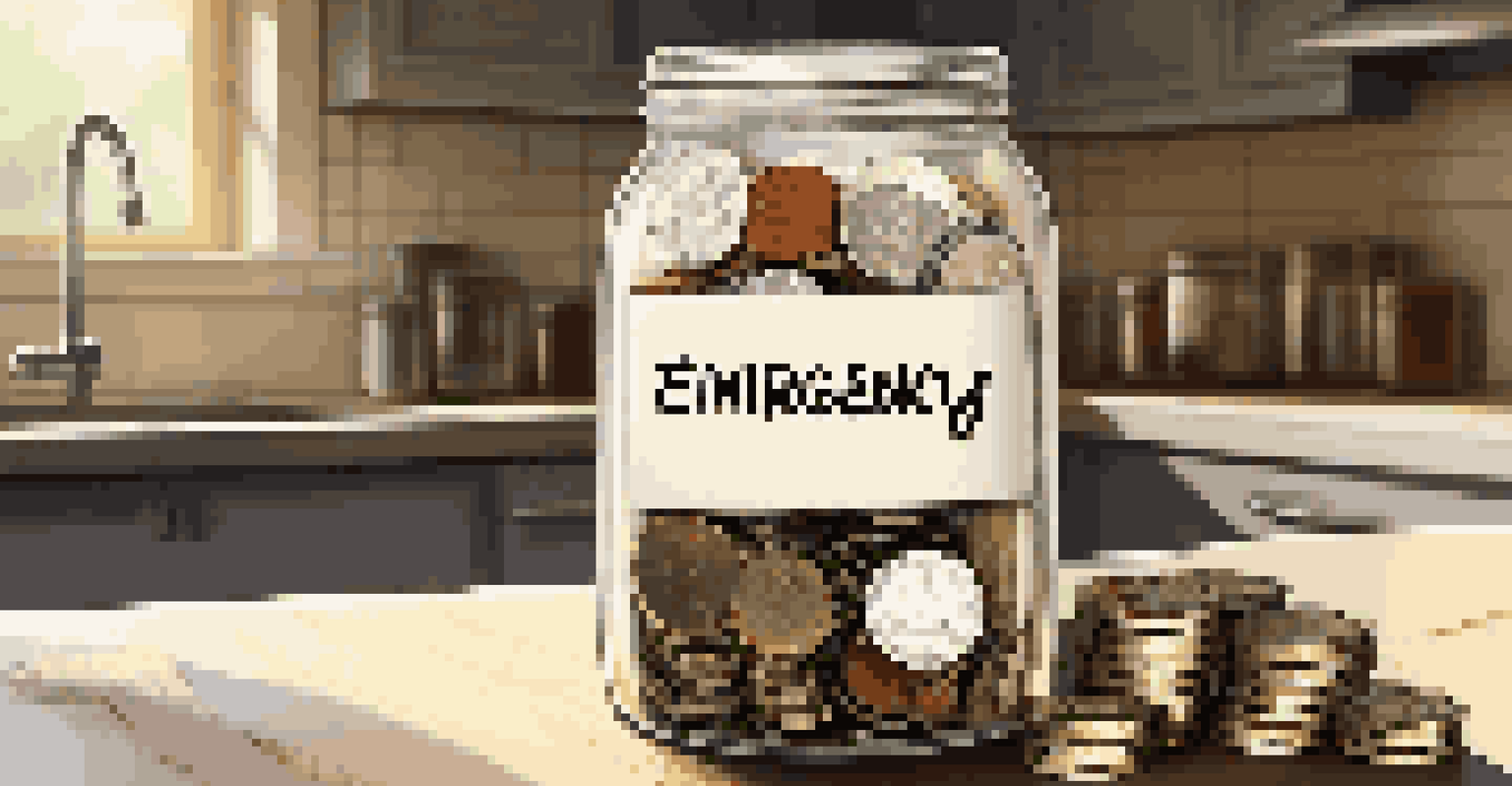Emergency Fund: A Key to Financial Independence

What is an Emergency Fund and Why You Need One
An emergency fund is a savings buffer that helps you cover unexpected expenses, like car repairs or medical bills. Think of it as your financial safety net, designed to keep you afloat during tough times. Without this cushion, you might find yourself scrambling for cash or resorting to credit cards, which can lead to a cycle of debt.
A budget is telling your money where to go instead of wondering where it went.
Having an emergency fund allows you to face life's uncertainties with confidence. Instead of stressing over a sudden expense, you can simply dip into your savings. This peace of mind is invaluable and can greatly reduce financial anxiety.
In essence, an emergency fund is not just a smart financial tool; it's a crucial step towards achieving independence. It empowers you to make choices based on your goals rather than being tied down by unforeseen financial crises.
Setting Realistic Goals for Your Emergency Fund
When starting your emergency fund, it's important to set realistic savings goals. A common recommendation is to aim for three to six months' worth of living expenses. However, your specific needs may vary depending on your lifestyle and financial situation.

To find your target amount, calculate your monthly expenses, including rent, groceries, utilities, and other essentials. This figure will give you a solid foundation for determining how much you should save. Remember, starting small is better than not starting at all.
Emergency Fund as Your Safety Net
An emergency fund acts as a financial buffer to cover unexpected expenses, providing peace of mind during tough times.
As you build your fund, keep revisiting your goals and adjust them as necessary. Life changes, whether it's a new job, a move, or a growing family, can impact your financial needs and how much you should have saved.
Where to Keep Your Emergency Fund
Once you know how much you want to save, the next step is deciding where to keep your emergency fund. Ideally, you want a place that offers easy access but also some interest growth. High-yield savings accounts or money market accounts are popular options for this purpose.
Do not save what is left after spending, but spend what is left after saving.
Avoid keeping your emergency fund in a checking account, as it typically earns little to no interest. Instead, look for accounts that provide competitive rates while allowing you to withdraw funds without penalties. This balance will help your money grow while ensuring it’s readily available when you need it.
Remember that the goal is to make your savings work for you, so do your research and find the best account that suits your needs. A well-placed emergency fund can be a smart financial move that contributes to your overall independence.
How to Start Building Your Emergency Fund
Starting an emergency fund doesn’t have to be overwhelming. Begin by setting aside a small amount regularly—this could be as little as $20 a week. Over time, these contributions will add up, making it easier to reach your goal without feeling like you're sacrificing too much financially.
Consider automating your savings to make the process even smoother. This way, a set amount gets transferred to your emergency fund every payday without you having to think about it. Automation can help you stick to your savings plan and reduce the temptation to spend that money.
Setting Realistic Savings Goals
Aim for three to six months' worth of living expenses when building your emergency fund, adjusting as your life changes.
Additionally, you can look for ways to cut unnecessary expenses. Redirecting even a small portion of your discretionary spending—like those daily coffee runs—can significantly boost your savings over time.
The Role of an Emergency Fund in Financial Independence
Having an emergency fund is a cornerstone of financial independence. It not only protects you from unforeseen expenses but also allows you to take calculated risks in other areas of your financial life. For instance, you might feel more comfortable pursuing a career change or starting a business.
When you know you have a financial safety net, you can make decisions based on what you truly want rather than fear of instability. This sense of security can empower you to invest in your future, whether through education or investment opportunities.
Ultimately, your emergency fund acts as a launchpad for greater financial freedom. It enables you to pursue your passions without the constant worry of financial setbacks holding you back.
Common Mistakes to Avoid with Emergency Funds
One of the most common mistakes people make is not setting up their emergency fund at all. It’s easy to think that you’ll save later, but life has a way of throwing curveballs that can derail even the best intentions. Start now, even if it’s with a small amount.
Another mistake is using the emergency fund for non-emergencies, such as vacations or impulse purchases. It’s essential to distinguish between what constitutes an emergency and what doesn’t. Stick to the purpose of this fund to ensure it’s available when you truly need it.
Avoid Common Emergency Fund Mistakes
It's crucial to avoid using your emergency fund for non-emergencies and to regularly reassess your savings goals.
Lastly, neglecting to reassess your fund over time can be a pitfall. As your life circumstances change, so should the size of your emergency fund. Regularly reviewing your savings goals will help you stay on track and maintain the financial cushion you need.
Conclusion: Start Your Journey to Financial Independence
In conclusion, building an emergency fund is a critical step towards achieving financial independence. This fund provides security and allows you to navigate life's uncertainties without constantly worrying about money. The sooner you start, the better prepared you'll be for whatever life throws your way.
Remember, financial independence isn’t just about accumulating wealth; it’s about creating a life where you have the freedom to make choices. An emergency fund is the foundation that supports this freedom, giving you the confidence to pursue your dreams.

So take that first step today. Start small, stay consistent, and watch as your emergency fund grows into a powerful tool for your financial independence journey.